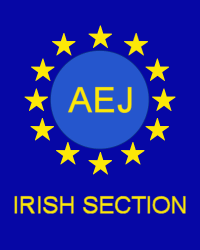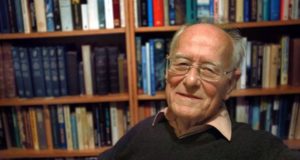By Mike Burns
To his many thousands of readers he was ‘James Downey’. To colleagues and friends he was simply and affectionately Jim’.To President Michael D. Higgins he was “one of Ireland’s most committed journalists”.Taoiseach Enda Kenny said he was “a man of singular abilities and was never afraid to say what was on his mind”.
These were among scores of tributes paid on the passing of our colleague, a former distinguished Chairman of the Irish Section of the Association of European Journalists.
Jim was born in September, 1933, in Dromahair, Co. Leitrim, where his father was a school principal. His mother died of cancer before he reached the age of three, leaving him to be brought up by his “stern, aloof and largely absent” father and his grandmother.
He was sent as a boarder to Newbridge College in Co. Kildare, returning to Dromahair, aged 18, and taking his first step on the way to his journalistic career – contributing weekly notes on the local community for the Sligo Champion, paid meagerly by the printed line. But it provided him with his route to mainstream journalism, joining the Carlow Nationalist under the late – and great – Liam D. Bergin. His poorly paid “Dromahair notes” had nevertheless given him an understanding of the importance of local news and he was appointed Portarlington correspondent of the Carlow Nationalist, covering everything from local courts to politics.
Not surprisingly, national newspapers beckoned and he joined the Irish Press as a general reporter, before moving to the Irish Times as a sub-editor, a political correspondent, a London correspondent and then back to Dublin as Deputy Editor and, what many people believed, the Editorship.
That did not happen and he was bitterly disappointed at being passed over.
Instead of becoming the paper’s Editor, he returned to Britain as London Editor. The Irish Times treatment rankled with him for many years, which he dealt with in his 2009 book In My Own Time.
But in London he immersed himself in British news and, in particular, the Westminster scene. He renewed acquaintance with politicians from all sides and made scores of new friends, too.
His insight in to British and European politics was exceptional. He had scores of contacts in London and Brussels and his always accurate reports and columns reflected the depth of his knowledge and information.
He had a brief and unsuccessful foray into Irish politics, when he ran for the Labour Party in 1969.
While he was London Editor of the Irish Times, Jim’s thoughts were always on Ireland, his wife Moira and daughters Rachel and Vanessa.
He returned to Dublin and founded the short-lived New Nation magazine.
Then, in 1989, he joined the Irish Independent as a columnist – and continued his wide-ranging and widely-read column for 27 years.
Dozens of colleagues, politicians and hundreds of local friends attended his funeral in the picturesque village of Dromahair, where he was laid to rest in Creevelea Abbey.

